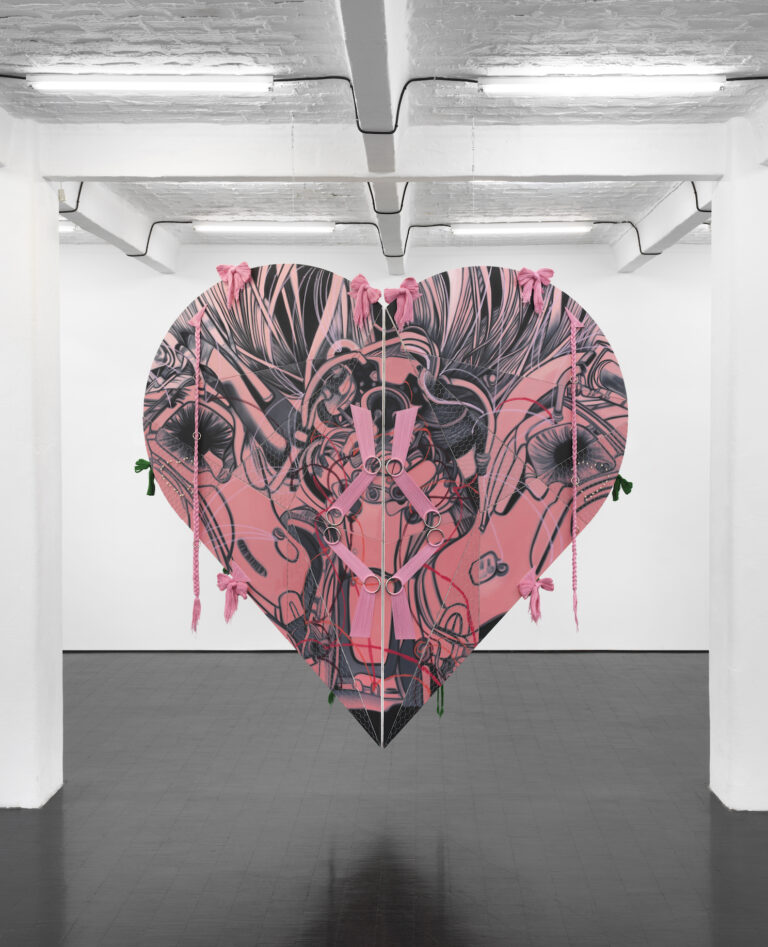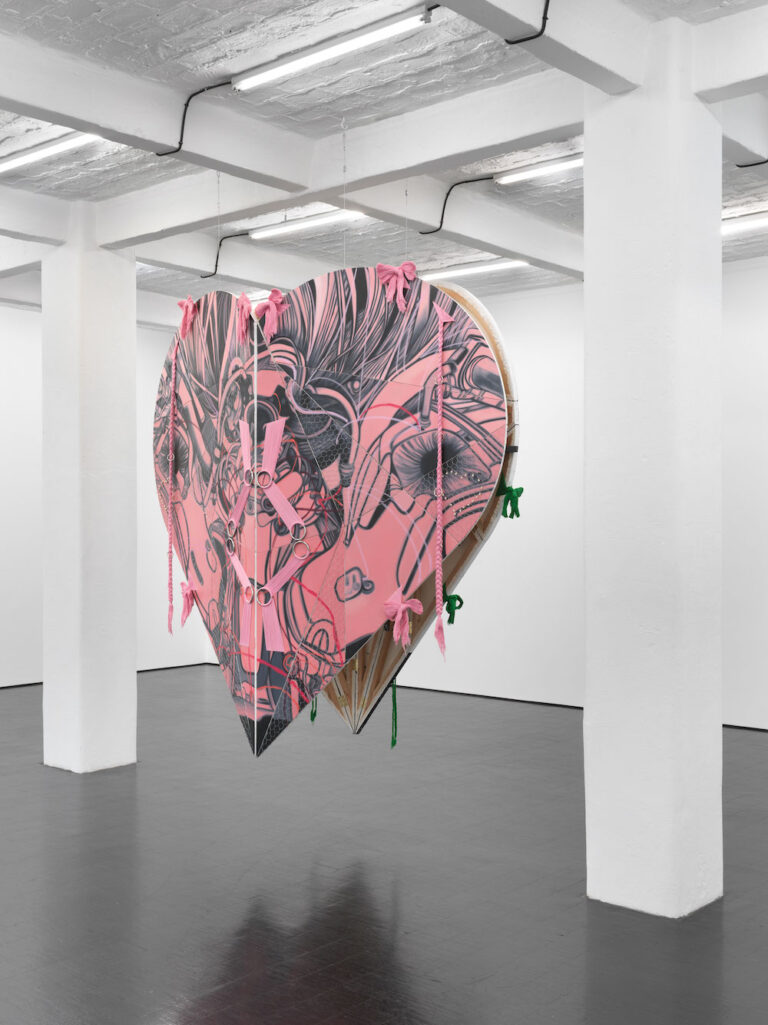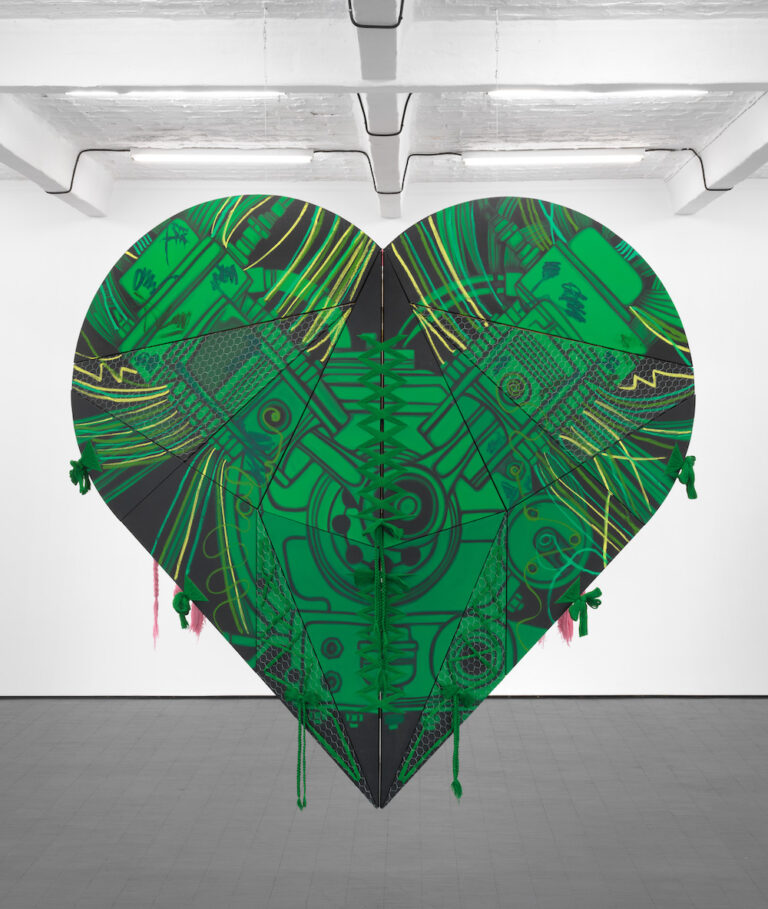Frieda Toranzo Jaeger
Heart Core
Galerie Barbara Weiss is pleased to announce Heart Core—the second solo exhibition at the gallery by Mexico City based artist Frieda Toranzo Jaeger.
The eight works on view demonstrate the breadth of Toranzo Jaeger’s interrogation and reimagining of art history and painterly convention. Hearts, car interiors, books, motors, Christian iconography, flowers and embroidery are juxtaposed, endeavoring to build a new symbolism. As a central theme of the exhibition, Toranzo Jager takes up the motif of the heart: the ubiquitous icon of love and affection. The symmetrical, scalloped shape has been used to symbolize devotion since the Middle Ages—and today carries the sum of centuries of shifted nuances.
In El poema se cayó, a heart shaped book is integrated into a networked cluster. Originally depicted in a Flemish painting from the 15th century, the book is held by a man, reading in front of an imposing cathedral – emphasizing love and marriage as a bond watched over by God. In Toranzo Jaeger’s rendering, the book floats in a cosmos of red rhinestones, linked to its visually similar companions by red yarn. Godly omnipotence is supplanted by interconnectedness, a clandestine reading group.
Systems of connectivity can also be found in Open your heart because everything will change – a double-sided heart consisting of 32 canvases suspended from the ceiling. On one side, painted in hues of pink, black and white, the heart depicts cables, pipes, inlets and outlets – the central organ of a mysterious machine, part engine part motherboard. Ornamented with metal rings, corsetry, long braids, fishnet-styled chicken wire, fake pearls, bows of thick bundles of yarn, the work’s adornments are suggestive of yet refuse clear identification.
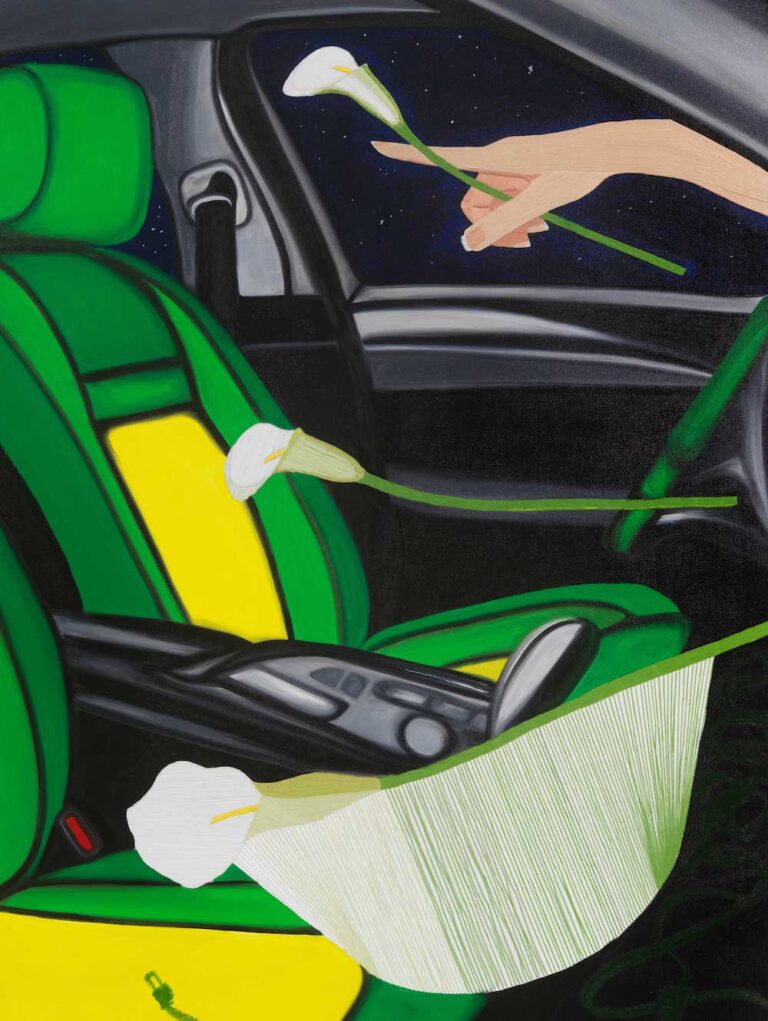
Frieda Toranzo Jaeger, Nature Dropout (detail), 2022, oil and embroidery on canvas, Courtesy of the artist and Galerie Barbara Weiss, Berlin, Photo: Jens Ziehe
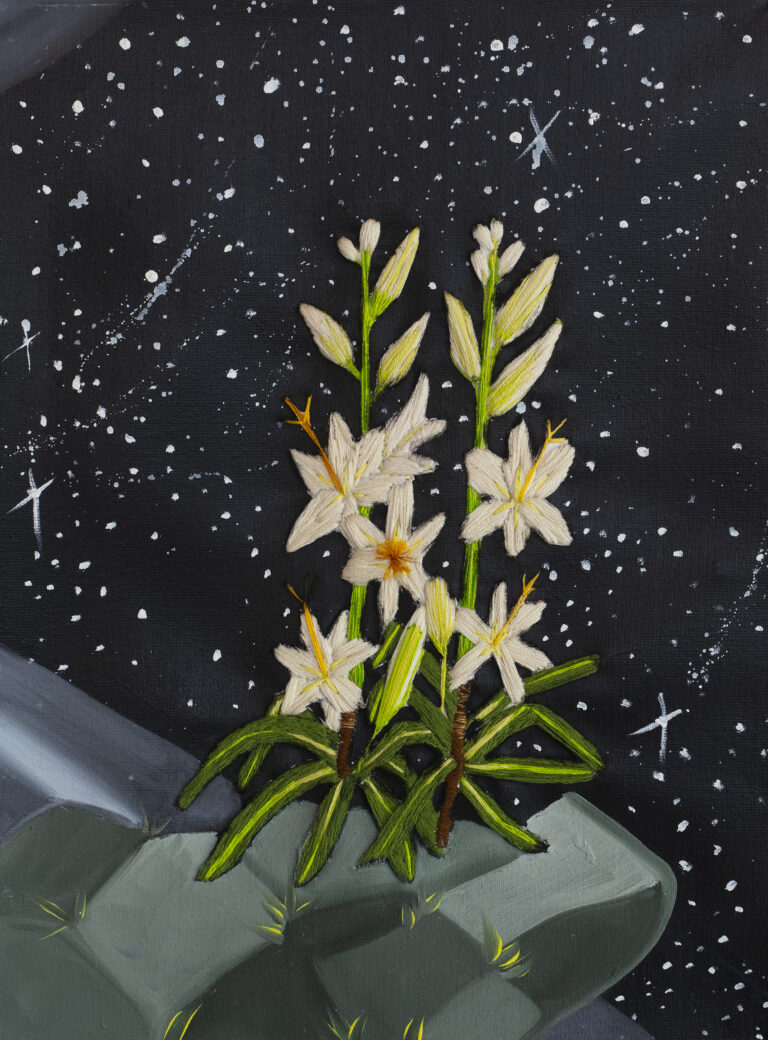
Frieda Toranzo Jaeger, Neo-Colonialism (detail), 2022, oil and embroidery on canvas, rhinestones, Courtesy of the artist and Galerie Barbara Weiss, Berlin, Photo: Jens Ziehe
“When I place a craft such as embroidery in my paintings, there’s a questioning of which history it belongs to. We’ve always seen history as being linear, but it isn’t; neither is it indestructible—we now know it’s a fabrication of those in power.”
Reverse, in green, black and ribbons of yellow oil crayon, is the schematic representation of an engine. Toranzo Jaeger is interested in the diagram as a productive entity, a tool for replicating, whether of an object or an ideology. The motor can come to symbolize power driven patriarchy, runaway emissions or simply where energy is produced. The diagram is also a function of painting, as it is a generative method of visual communication, a visual and historical framework that allows a painter’s work to both materialize and be understood. The work’s optimistic title points to the prevailing sentiment of Toranzo Jaeger’s work—the world will change, whether some like it or not, and the more we embrace it the brighter the future can be.
Painting and desire are both mental engines, setting things in motion, allowing change to the course of events. One is reflective, communicative, and the other, irrational, and occasionally destructive. Step In, a painting consisting of four heart-shaped canvases hinged together is slumped on the floor, literally unhinged, the connection between the car and the heart is broken up, its parts ready to take up a different place in the semantic order.
The embodiment of desire is a longtime theme of Toranzo Jaeger’s—whether via literal depictions of lovers or her continued use of the car interior as a space of fantasy projection and fulfillment. Her latest works contrast conscious and unconscious desires—questioning what spurs them and how they are sustained. In Neo-Colonialism a self-driving car interior looks out onto a vast expanse of space—embroidered on the two flanking panels are plants and minerals. Metaphorically probing the experience of driving as an incarnated fantasy of male control, Toranzo Jaeger asks how this conquering desire became intertwined with the imagined futures that are presented to us—with the world in ruin and ultra-wealthy men racing to colonize the next, far-flung frontier. The work’s tri-part form is taken from the winged altarpieces that date back to an era where painting was integral to circulating ideology. It was such painting—modular and mobile—that was used to bring Christian iconography (and all that came with it) to the „New World“—vessels of the ideological conquest that shadowed the military.
Toranzo Jaeger’s practice opens a space that looks beyond society’s current confinement within the capitalistic and exploitive structures that have shaped it—often reframing them visually to advocate for radical thought and social progress. Using the historical practice of painting, itself a restrictive space with a discriminating history, Toranzo Jaeger subjects the medium to détournement and criticism from within. Along with her liberal allusions to history painting—from unknown Flemish masters, to Lucas Cranach, to Diego Rivera—many of her canvases are punctuated by embroidery. In doing so, Toranzo Jaeger interweaves craft into a sacrosanct space that always attempted to set itself apart from vernacular forms of making. This act of disobedience questions not only the placement of value in art history, but also suggests that history is a fabrication of those in power.
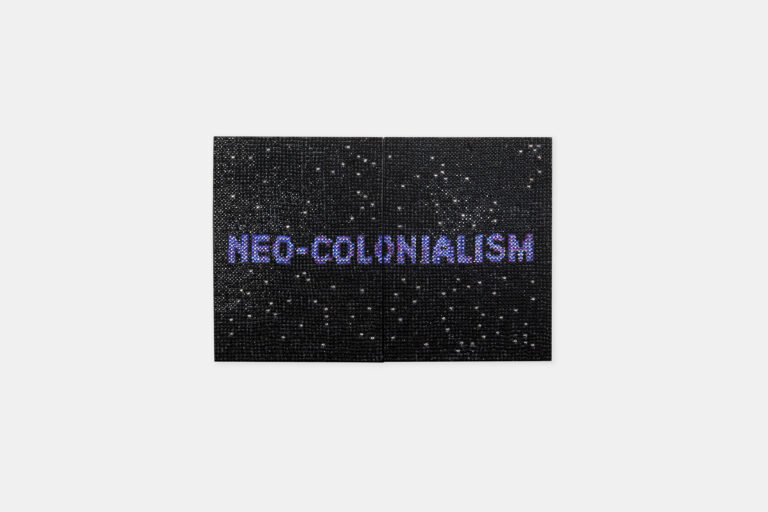
Frieda Toranzo Jaeger, Neo-Colonialism, 2022, Courtesy of the artist and Galerie Barbara Weiss, Berlin, Photo: Jens Ziehe
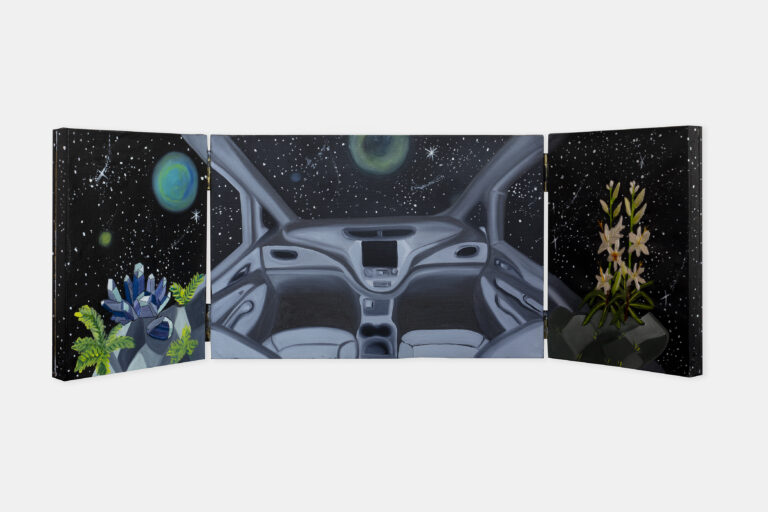
Frieda Toranzo Jaeger, Neo-Colonialism, 2022, Courtesy of the artist and Galerie Barbara Weiss, Berlin, Photo: Jens Ziehe
“The main motivation behind my work is to create a post-colonial, decolonizing practice and approach—a practice that can decolonize your mind, your feelings and your body because colonization starts in the body.”
Frieda Toranzo Jaeger (b.1988, Mexico City) was the subject of a recent solo survey exhibition at MoMA PS1, Queens. She has had solo exhibitions at the HFBK, Hamburg; Baltimore Museum of Art; Arcadia Missa, London, United Kingdom; Galerie Barbara Weiss, Berlin; and Reena Spaulings, New York. Her work has recently been included in exhibitions at National Gallery of Victoria, Melbourne; BALTIC, Gateshead, United Kingdom; Frac Lorraine, Metz, France; KW Institute for Contemporary Art, Berlin; and MoMA Warsaw, Poland. A major installation by Toranzo Jaeger was recently acquired by the Hammer Museum, Los Angeles.

